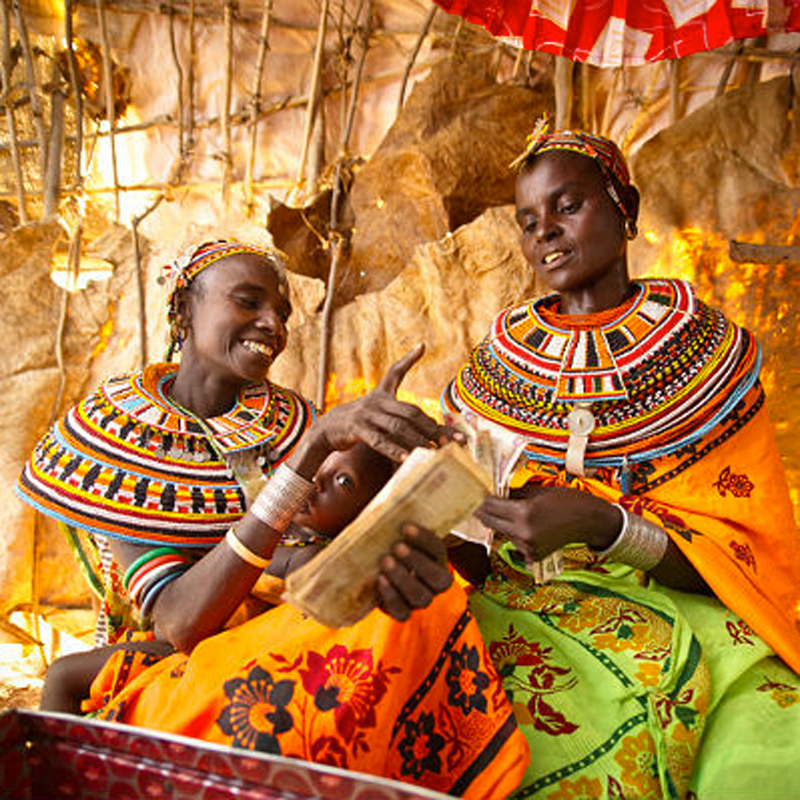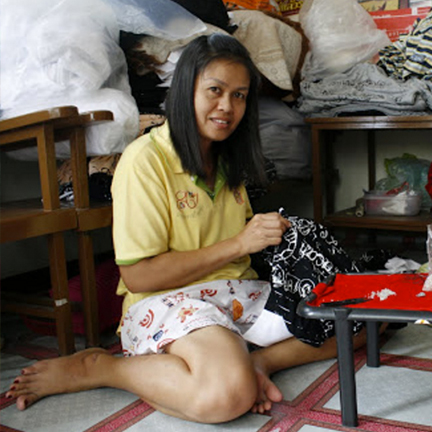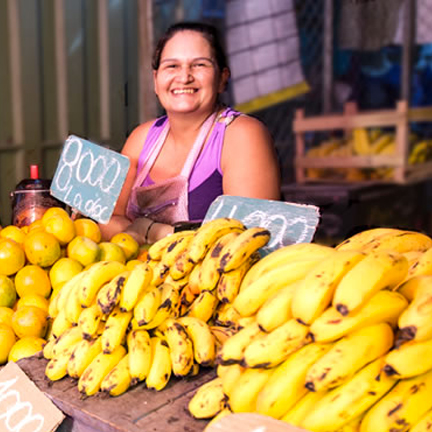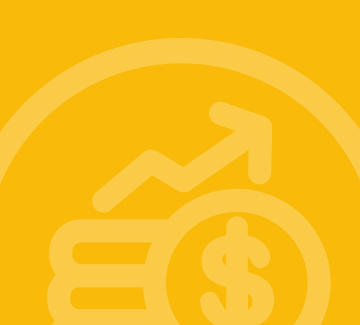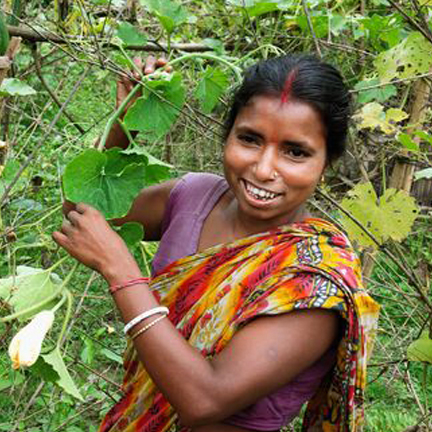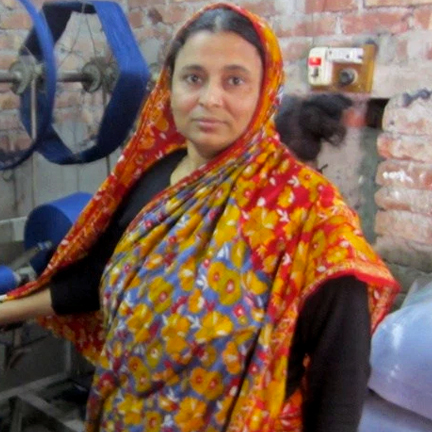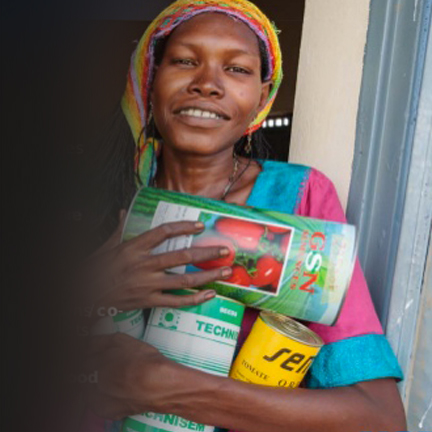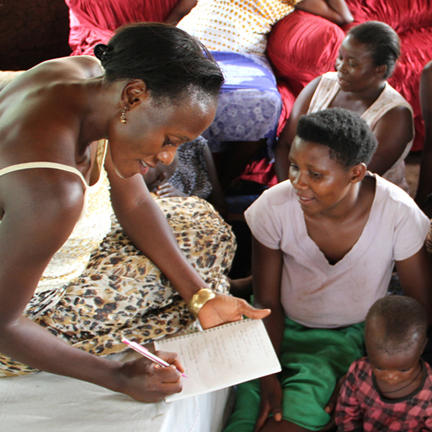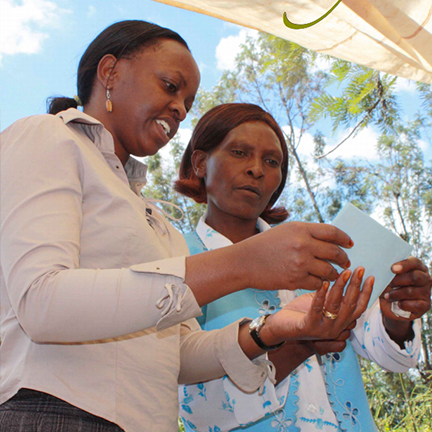Boost Women’s Economic Empowerment
Women’s economic empowerment is a pre-requisite for inclusive and equitable economic growth.
Women around the world are resilient and resourceful economic agents, overcoming persistent, gender-based barriers to advance the health, education, and economic security of their families. Evidence shows that women’s full participation in the economy drives better performing and more resilient businesses and supports economic growth and wider development goals for nations.
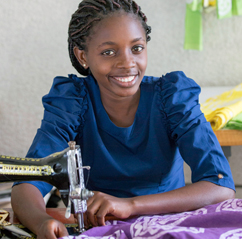
Need Evidence
and Strategies?
-

$10 trillion is the estimated annual value of women's unpaid work, 13% of global GDP
-

104 countries have at least one law impeding women’s economic opportunities
-

Globally, only 65% of women have a bank account, compared with 72% of men
-

If another 600 million women had access to the internet, annual GDP could increase by as much as $18 billion across 144 developing countries
-

Fully closing gender gaps in workplaces would add up to $28 trillion in annual GDP by 2025
Investing in girls and women creates a ripple effect that yields multiple benefits, not only for individual women, but also for families, communities, and countries. Increasing women’s control over household income improves their children’s access to school and healthcare; gives women greater control over their reproductive health; improves women’s ability to make environmentally friendly choices; boosts women-run businesses; and improves their status within families, communities, and entire countries.
Solutions in Action
-
Helping Women Graduate from Extreme Poverty
The BOMA Project is a U.S. nonprofit and Kenyan NGO that implements a unique gender-focused two-year poverty graduation program in the arid lands of eastern Africa. The Rural Entrepreneur Access Project (REAP) replaces aid with sustainable income and helps women to graduate from extreme poverty by giving them the tools they need to start small businesses in their communities and become self-reliant. With this new and diversified source of income, they can feed their families and access better sources of nutrition, pay for school fees and medical care, accumulate savings for long-term stability, survive drought, and adapt to a changing climate. In a comprehensive 2016 graduation exit evaluation, after two years in the program, 94% of women have graduated from extreme poverty; 98% of women have savings; and there is an 81% decrease in the number of children going to bed without an evening meal, a remarkable success rate. Since 2009, BOMA has impacted more than 86,000 mothers and children, with a goal of 100,000 by 2018, and 1 million by 2021. -
HomeNet Thailand
A member of Bangkok’s Foundation for Labor and Employment (FLEP), HomeNet Thailand implemented a successful project called “Organized Strength for Home-Based Workers.” (2009-2011) Building a federation of home-based worker organizations throughout the country – with 3,000 paying members – the project focused on key workers’ issues, such as social protection, legal status, and labor rights. Its objectives were to: improve the livelihood security of home-based workers in the informal economy through collective organizing; grant access to social protection schemes for poor working women, with an emphasis on Occupational Health and Safety (OHS); and enhance the economic empowerment of the working poor. The project had significant impact, not the least of which was the government’s adoption of the Home-Workers Protection Act, which helps protect an estimated two million women by ensuring legal frameworks are in place for equal pay and occupational health and safety. In addition, the government adopted a policy to provide a 30% social security co-payment for informal workers, benefiting an estimated 24 million informal workers in Thailand. -
-
Promoting Entrepreneurship among the Youth of Paraguay
Fundación Paraguaya is a non-governmental organization founded in 1985 that has spearheaded microfinance and entrepreneurship, helping youth to acquire the skills necessary to launch their own rural enterprises, access decent work in the agriculture/livestock sector, or continue their studies. The model, which is easily replicated, includes: 1) a microcredit program for 86,000 small and emerging micro-entrepreneurs who are largely ignored by other microfinance institutions; 2) entrepreneurial and financial education for children and youth; 3) financially self-sustaining farming high schools that train children of poor farmers to become their own rural entrepreneurs. -
The Greatest Predictor of Poverty in India is Landlessness
An estimated 18 million families in rural India are landless and tens of millions more have insecure rights to the land they rely on. Their long-term insecurity and inability to protect and secure the land they depend on is a major predictor of poverty, seeds conflict, and hinders economic growth.38 Since 2000, Landesa has been working to change this reality. By partnering with state and central government leaders, Landesa strives to create opportunity, incentive, and security through strengthening land rights. Landesa supports the creation of policies that strengthen girls and women’s land rights, raise legal awareness, and grant homestead and farmlands to rural women. By working with Indian state government officials and Central government leaders, Landesa has reached more than one million families.40 Increasingly, leaders in India’s poorest states are recognizing that insecure land tenure is a significant hurdle to development and stability. Already, the governments of Bihar, West Bengal, Odisha, Karnataka, Andhra Pradesh, Telangana, and Uttar Pradesh have launched programs to bolster women’s and girls’ land rights. -
The Shakti Foundation’s Mobile Money Model
Shakti Foundation, through USAID’s Mobile Solutions Technical Assistance and Research (mSTAR) program, is partnering with Airtel Bangladesh Limited to disburse micro-credit to farmers and salary payments to Shakti Foundation employees using mobile money. Under this project, Shakti Foundation for Disadvantaged Women disburses a total of 5 million Bangladeshi Taka (BDT) per month (about USD $63,500) to 1,000 staff and farmers. This mobile money model is advantageous to women for three reasons. First, both female staff and farmers have greater control over their money directly, as it is held in a mobile wallet offering greater privacy than cash payments. Second, it reduces the risk of gender-based violence often associated with carrying cash. And third, it reduces transactional and opportunity costs associated with traveling and waiting for cash payments, thereby allowing for greater investments in each recipient’s agricultural production. -
The Yaajeende Nutritional Value Chain Project in Senegal
The Yaajeende Nutritional Value Chain Project, which started in 2010 in Senegal, was a five-year USAID Feed the Future project to counter deeply entrenched cultural biases against women owning land. The project was recently extended due to its successful holistic model, making it a seven-year program which will be underway until 2017. The project works to harmonize legal regulations and customary practice by engaging local leaders to identify culturally-appropriate means for women to gain land ownership. Local leaders identify degraded land that was thought unprofitable and allowed women’s groups – as opposed to individual women – to own the land as a collective. The Yaajeende project works with the women’s groups to make the land profitable, following an integrated approach that incorporates nutrition, economic empowerment, and environmental sustainability. Now, men in the local communities recognize the value of this reclaimed land, as well as the importance of women’s collectives to have ownership and decision-making power over it. -
Village Savings and Loan Associations
The need for comprehensive, well-tailored financial services for women starts at the most local level. One innovative model that is well suited to local women is the Village Savings and Loan Associations (VSLAs). Introduced by CARE in Niger in 1991, VSLAs target women living in poor, often rural communities with little or no access to financial institutions. Savings is a first step to financial security, and the next step is low-cost loans. After years of engaging in weekly savings and loans and gaining financial literacy and confidence, the VSLAs integrate more formal institutional engagement, such as official bank accounts and credit. Overall, the model has demonstrated consistent positive results increasing women’s access to financial tools and income, as well as improving individual and household welfare, such as nutrition, access to health services, and quality of housing. Another model that works with women at various levels is BRAC, one of the world’s largest international development organizations. Founded in Bangladesh, BRAC created multiple intervention points for women and men to move from extreme poverty, to poverty, to self-sufficiency. Multiple organizations around the world have now used and adapted BRAC’s model. -
WIEGO Organizing
Evidence from the global research and policy network WIEGO (Women in Informal Employment: Globalizing and Organizing) illustrates why it is important to invest in women’s organizations and to help them build capacity. Under a grant from the Dutch Ministry of Foreign Affairs, the WIEGO network implemented the “Fair Trade for Women Producers” project through partner organizations in Asia, Africa, and Latin America. The project resulted in increasing access to financial services, training, and markets and the majority of participating collective enterprises saw significant increases in financial access and income for their membership base. The project also increased membership and economic networks. The Indian women’s handicraft enterprise Sadhna, for example, was able to grow from a group of 15 women to nearly 700 organized into 49 sub-groups. Additionally, by promoting stronger leadership roles within mixed male-female enterprises and cooperatives, the mixed 7,000-member Gumutindo Coffee cooperative in Uganda changed its policies to require 50% of board members to be women. The program achieved greater solidarity, formalization, and capacity. The Baraka Women’s Group in Kenya, through registration with the Ministry of Gender, was able to access agricultural extension services for the first time, resulting in increased production and profit.
Policy Asks
-
Ensure all women have the tools to fully participate in the economy through increased access to comprehensive and equitable financial services, including credit, loans, savings, and insurance.
-
Invest in and be inclusive of women’s organizations and cooperatives to strengthen their visibility and representation; prioritize asset development, including capital, securing land and inheritance rights, and skill building programs, including financial literacy and management skills.
-
Invest in policies and social protection systems to create an enabling environment for women to enter and thrive in the formal and informal labor markets, such as family leave, daycare, flexible work hours, and social security.
-
Champion the tenets of decent work for women, including equal access to employment, benefits, training, and leadership positions; equal pay; and a safe and harassment-free work environment.
-
Create economic policies that recognize and financially support girls and women’s unpaid household and care work, while reducing and redistributing its burden.
-
Invest in women’s Small and Medium Enterprises (SMEs) and women entrepreneurs through inclusive financing and comprehensive training.
-
Incorporate gender-based violence prevention and response strategies into women’s economic empowerment initiatives.
-
Tackle adverse gender norms and promote positive role models amongst both women and men.

